人教版选修8:Unit 4 Pygmalion Warming up and reading(共41张PPT)
文档属性
| 名称 | 人教版选修8:Unit 4 Pygmalion Warming up and reading(共41张PPT) | 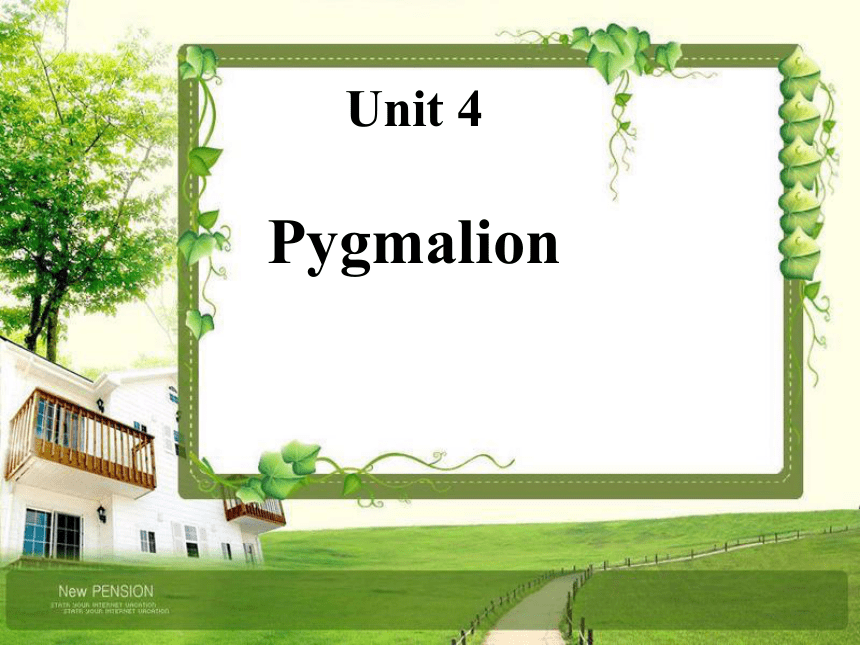 | |
| 格式 | zip | ||
| 文件大小 | 4.3MB | ||
| 资源类型 | 教案 | ||
| 版本资源 | 人教版(新课程标准) | ||
| 科目 | 英语 | ||
| 更新时间 | 2014-06-19 16:29:05 | ||
图片预览

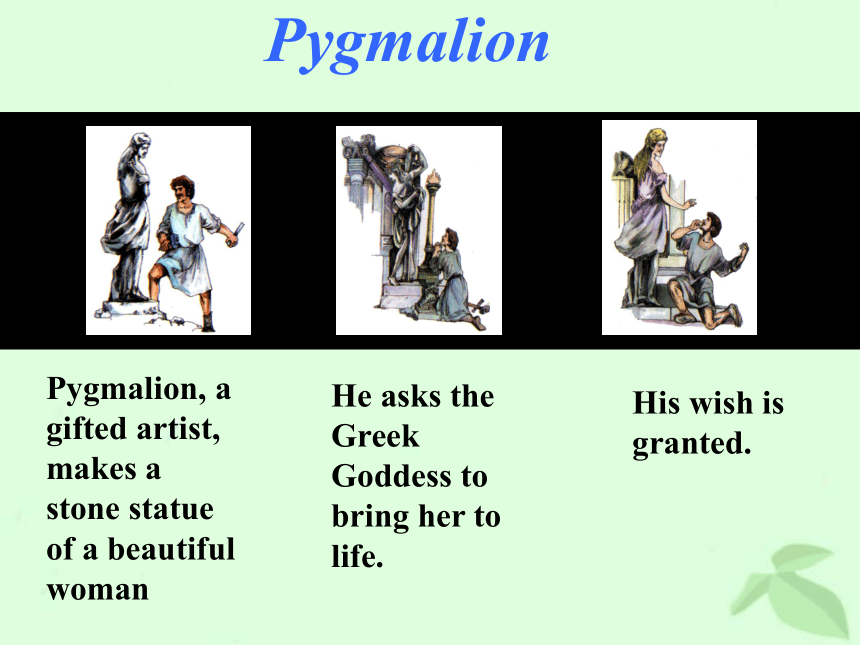
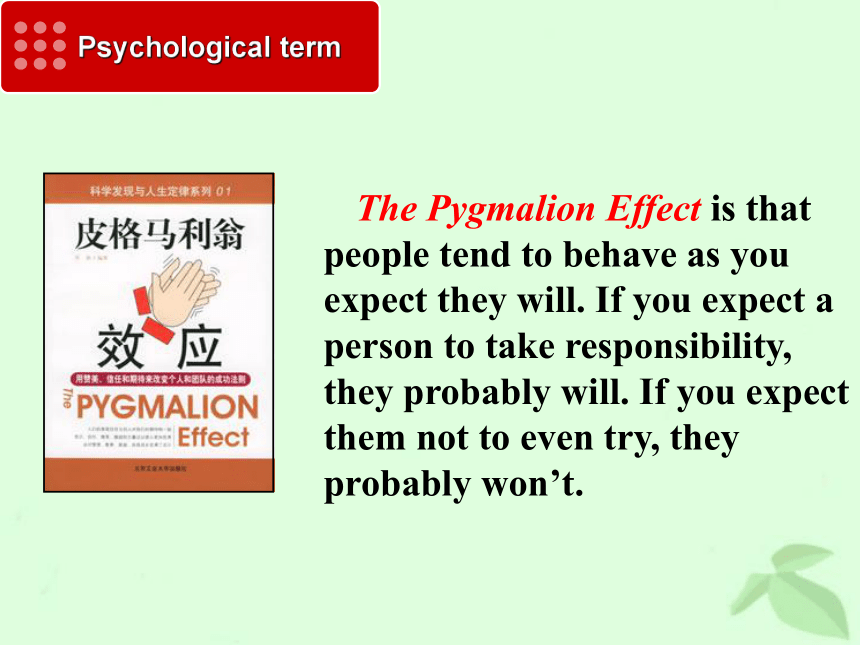
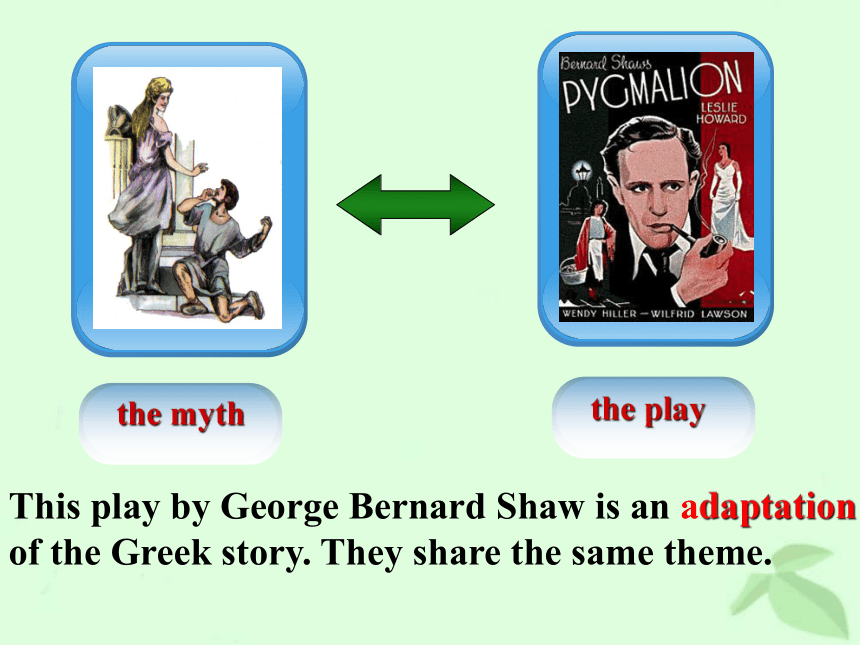

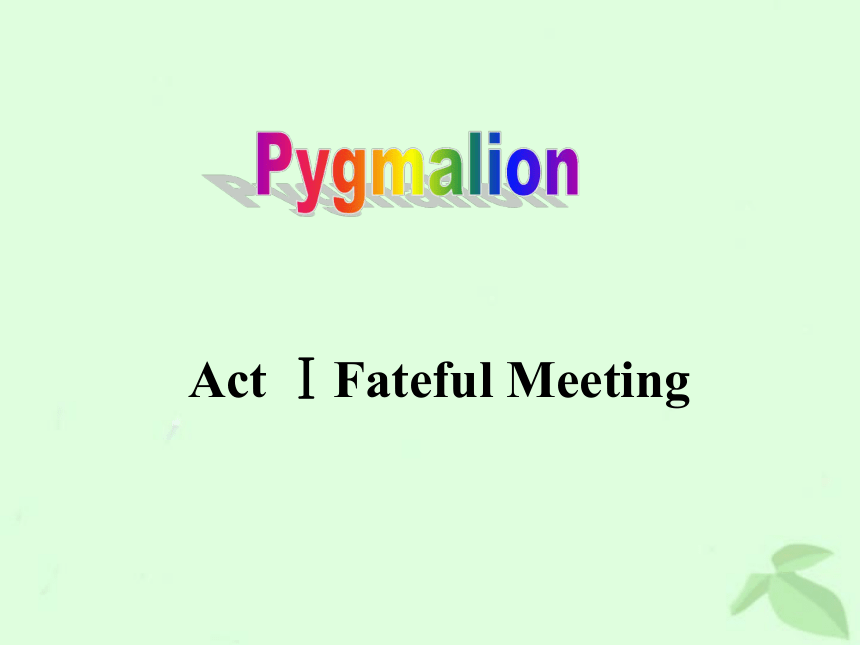
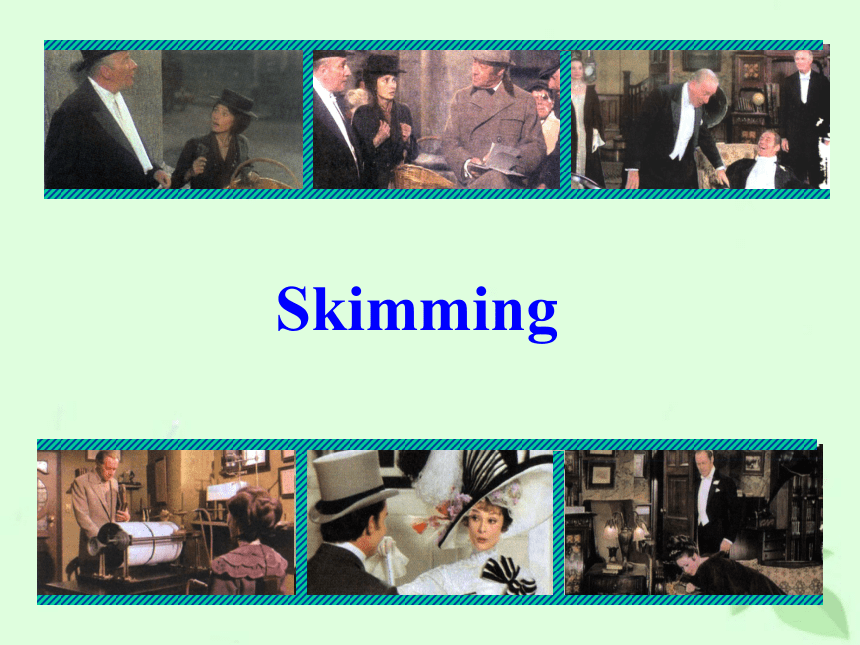
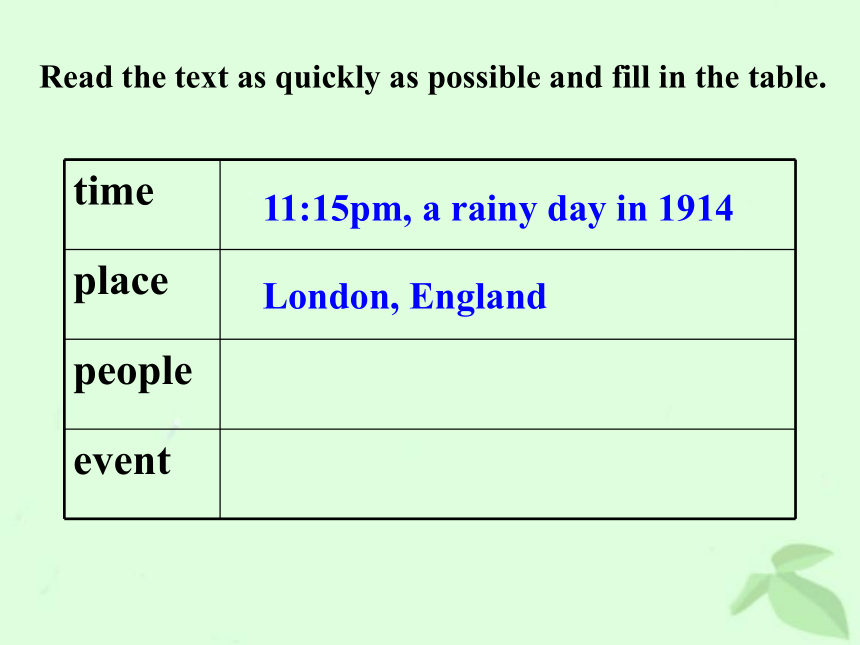
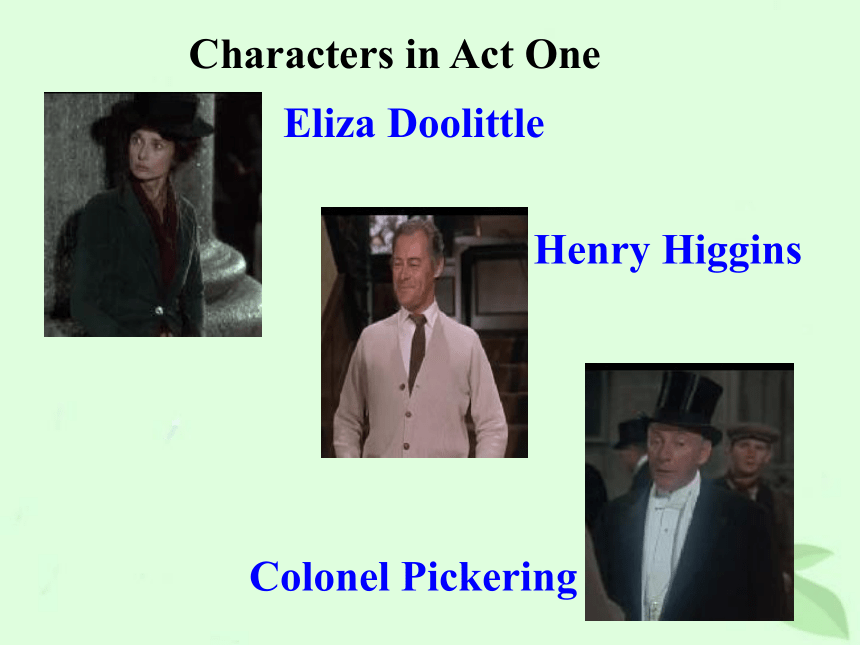
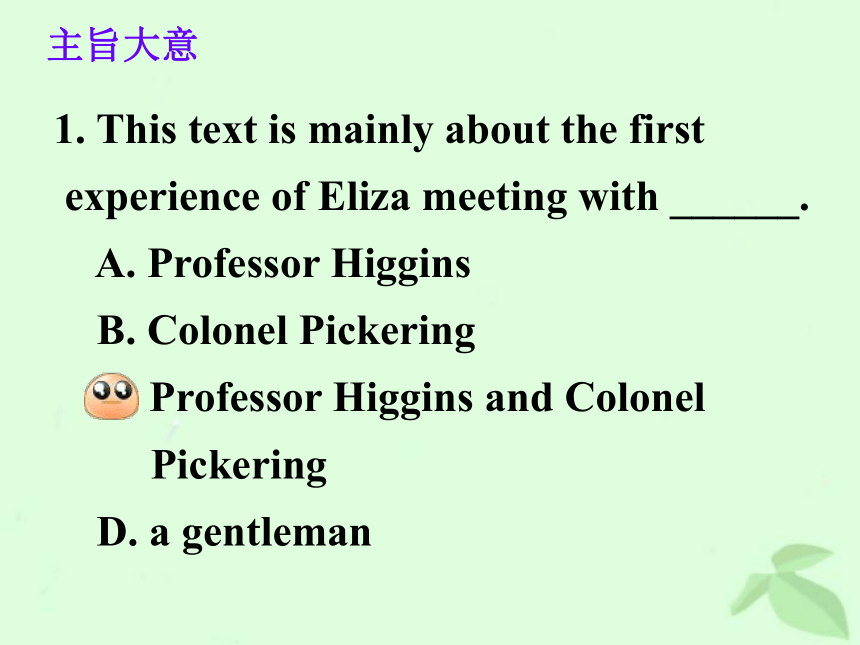
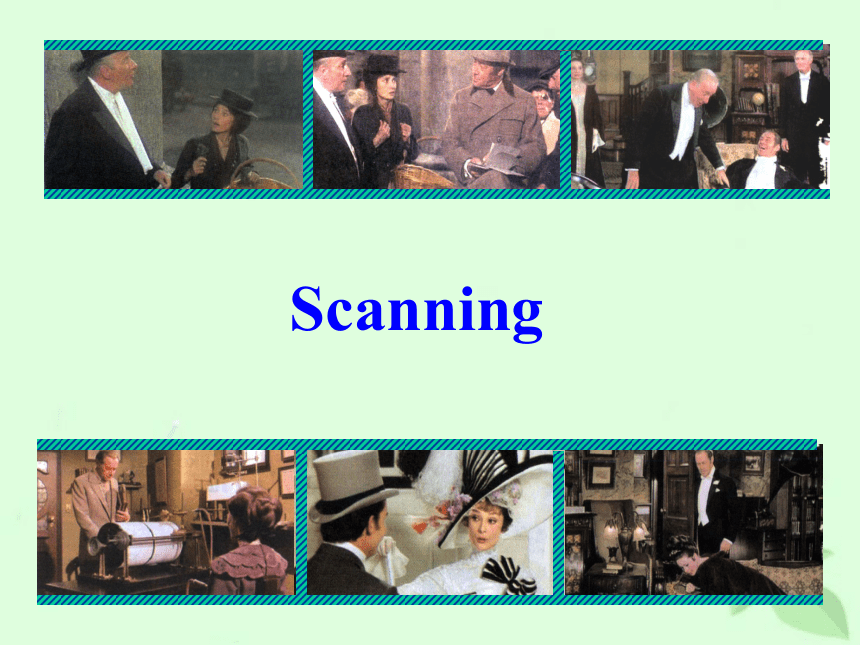
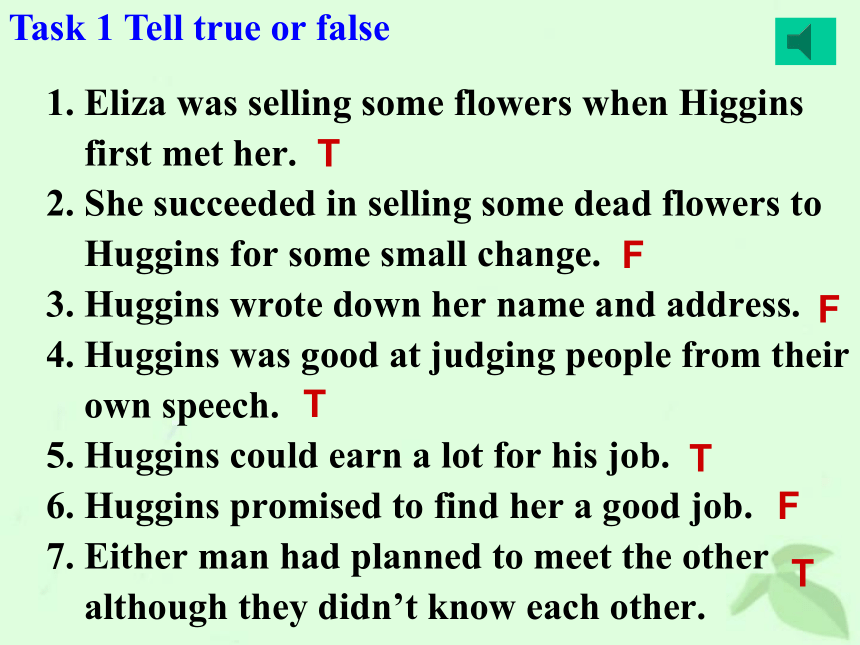
文档简介
课件41张PPT。Unit 4
PygmalionHis wish is granted.He asks the Greek Goddess to bring her to life.Pygmalion, a gifted artist, makes a stone statue of a beautiful womanPygmalion The Pygmalion Effect is that people tend to behave as you expect they will. If you expect a person to take responsibility, they probably will. If you expect them not to even try, they probably won’t.the myththe playThis play by George Bernard Shaw is an adaptation of the Greek story. They share the same theme.The author-----George Bernard ShawAn Irish dramatist, literary critic, a socialist spokesman, and a leading figure in the 20th century theater. PygmalionAct ⅠFateful MeetingSkimming Read the text as quickly as possible and fill in the table.11:15pm, a rainy day in 1914London, EnglandCharacters in Act OneEliza DoolittleHenry HigginsColonel Pickering 1. This text is mainly about the first experience of Eliza meeting with ______.
A. Professor Higgins
B. Colonel Pickering
C. Professor Higgins and Colonel
Pickering
D. a gentleman主旨大意Scanning
1. Eliza was selling some flowers when Higgins
first met her.
2. She succeeded in selling some dead flowers to
Huggins for some small change.
3. Huggins wrote down her name and address.
4. Huggins was good at judging people from their
own speech.
5. Huggins could earn a lot for his job.
6. Huggins promised to find her a good job.
7. Either man had planned to meet the other
although they didn’t know each other.T F F T T F T Task 1 Tell true or false Task 2 Analysislower
classJob:
Language:
Behavor:sell flowersbroken & informalrudeEliza Doolittlemiddle
classJob:
Language:
Behaviour:research phoneticsrude to E polite to PProfessor Higgins standardupper
classJob:
Language:
Behaviour:
work for the armygentleColonel PickeringstandardDiscussionChoose adjectives to describe each character in the play.impatient kind polite confident
anxious eager rude enthusiastic
unsure generous ambitious
superior emotional self-importantChoose adjectives to describe each character
in the play.Henry Colonel Elizaimpatient, rude, confident, superior, self-importantkind, polite, generous,
enthusiastic, eager, confidentanxious, eager, emotional
ambitious, unsureCorrect all these sentences in terms of grammar, spelling,etc.
1. Come over’ere, cap’in, and buy me flowers off a poor girl.Come over here, captain, and buy some flowers
From a poor girl.2. I ain’t done nothing wrong bu speaking to that
gentleman.I haven’t done anything wrong by speaking to
That gentleman.3. I thought maybe you was a policeman in disguise.I thought maybe you were a policeman in disguise4. How do I know whether’ ou took me words
down right?How do I know whether you wrote down what I
said accurately?5. A shop assistant ? Now that’s sommat I want,
that is!A shop assistant? Now that’s something I would
like to be!What was Eliza going to do next?Act II making the betWho made this bet?
What was the bet?
3. Why did they make this bet?
Colonel Pickering made a bet with Henry Higgins.If Henry can turn Eliza into a lady in three months, Pickering will consider Henry the greatest teacher alive, and he also agrees to pay all the costs himself. 1. Eliza came to visit Henry Higgins and Colonel Pickering in order to let them _________
A. give her some money
B. give her a job as a flower shop’s
assistant
C. teach her speak well
D. have a bath 2. Aliza only offered them ________ if they could teach her.
A. 1 shilling B. 2 shillings
C. nothing D. 3 shillings 3. Henry Higgins and colonel Pickering finally decided to _______ Eliza.
A. throw back
B. teach
C. only teach her how to speak
D. beat 4. Eliza refused to have a bath, from what she said, we can infer that she lived a ________ life.
A. miserable B. happy
C. good D. dirty推理判断5. From act II, what can you infer?
In order to prove himself, Higgins decided to teach Eliza free of charge
Eliza had to change her grammar as well as pronunciation if she wanted to speak well
When the bet was over, Eliza might get a job in a flower shop.
Eliza would return to the gutter selling flowers in the street when once the experiment was over.Rewrite these sentences using correct english.
1. I wanna be a lady in a flower shop ’stead o’ selling flowers in the street.
2. Now yer talking…. You wouldn’t have the face to ask me for the same for teaching me as yer would for French.
3. I can’t. I dursn’t. It ain’t natural and it’d kill me.I want to be a lady in a flower shop instead of selling flowers in the street.Now you’re talking… You wouldn’t dare to ask the same (amount) for teaching me (my own language) as you would for (teaching me) French.I cannot. I daren’t. It isn’t natural and it would kill me.Discussion
1. In what ways is Henry like Pygmalion?
2. In what ways is Eliza like the statue-
woman?
3. How do you think their relationship is
going to develop?
4. What difficulties do you predict for them?ListeningBefore you listen to Act Two, Scene 2, discuss in groups of four what you need to do to change Eliza into a lady. Make a list and then think about how you will make each change. Then prepare to present your idea to the class.Listening Act Two, Scene 2 Changing ElizaAct Two, Scene 2 Changing Eliza
H: Good morning, Eliza. My goodness, how pretty you are after a good bath! Ready for your first lesson? You see, Colonel Pickering and I are both here waiting.
E: Than’ you sir!
H: So let’s begin. Say your alphabet.
E: I know my alphabet. Do yer thin’ I know noffink!
H: Now, now! Let’s start again. Say this after me. (very slowly, loudly and carefully) Do you think I don’t know anything?
E: Do yer think I don’t know anythink!CP: Do you know, Higgins, I think that was better!
H: (far from satisfied) Once more, Eliza. (emphasizing each word) Do you think I don’t know anything!
E: (very slowly and carefully too) Doo yoo think I don’t know anything!
H: Now to the alphabet, my girl. Don’t argue--- just say it.
CP: Yes, say it, Eliza! You’ll understand soon. Do what he tells you and let him teach you in his own way.
E: Oh, well! If you it like that! Ahyee, Bayee, Sayee, Dayee…H: (bored) Stop at once. Now say A, B, C and D.
E: (in tears) But I am saying it. Ahee, Bayee, Sayee, Dayee…
H: Stop! Say “a cup of tea”.
E: I cap-o-tee.
H: Put your tongue forward until it pushes against the top of your lower teeth. Now say “cup”.
E: C-c-c. I can’t hear no difference’ cept that it sounds more genteel--- like when you say it. (begins to cry)
H: (angrily) Well, if you can hear that, why are you crying? Now try again, Eliza.E: C-Cup.
CP: Splendid, Miss Doolittle. Never mind a little crying, you are doing very well. The lesson won’t hurt. I promise not to let him pull you round by your hair.
H: Now try the whole thing, Eliza. A cup of tea.
E: (very slowly and with enphasis) A cu-up of tea.
CP: Good, good!
H: Better, better! Now try this sentence. “The rain in Spain falls mainly on the plain”.
E: (again with emphasis) The rine in Spine falls minely on the pline. H: (excitedly) It’s coming! It’s coming! Now try again, Eliza. (slowly) The rain (ai, ai, ai) in Spain (ai, ai, ai) falls mainly on the plain.
E: The rai-ain in Spai-ain falls mai-ainly on the plain.
CP: Miss Doolittle, go and practise by yourself. Keep your tongue well forward of trying to swallow it.
E: (beginning to cry) Oah! Oah!
H: (angrily) Now Eliza, go and tell Mrs Pearce about this lesson. Think about it and practise by yourself. Away with you!(Eliza is still sobbing, rushes from the room)
CP: Now Henry, couldn’t you have been kinder to that poor girl after all the effort she made?1. Eliza’s clothes
2. Eliza’s hygiene
3. Eliza’s behaviour1. Buy new ones
2. Give her baths
3. Learn how to walk
and behave in
upper class social
activities4. Her language:
★ grammar
★ pronunciation
★ use of appropriate language (eg no swearing)4. Have lessons to help her with all three problems:
★ learn the rules
★ practise repeating words till correct
★ learn socially safe topics to discussShe got the phrases and sentences correct after repeating them twice: “Do you think I don’t know anything?” “a cup of tea” “The rain in Spain falls mainly on the plain”.Her “ai” in “The rain in Spain falls mainly on the plain” and her alphabet.She still doesn't know about double negatives (don’t, no), so her meaning is the opposite of what she means. Her sentence “I can’t hear no difference” means “ I can’t hear any difference”.I can’t hear no difference…
PygmalionHis wish is granted.He asks the Greek Goddess to bring her to life.Pygmalion, a gifted artist, makes a stone statue of a beautiful womanPygmalion The Pygmalion Effect is that people tend to behave as you expect they will. If you expect a person to take responsibility, they probably will. If you expect them not to even try, they probably won’t.the myththe playThis play by George Bernard Shaw is an adaptation of the Greek story. They share the same theme.The author-----George Bernard ShawAn Irish dramatist, literary critic, a socialist spokesman, and a leading figure in the 20th century theater. PygmalionAct ⅠFateful MeetingSkimming Read the text as quickly as possible and fill in the table.11:15pm, a rainy day in 1914London, EnglandCharacters in Act OneEliza DoolittleHenry HigginsColonel Pickering 1. This text is mainly about the first experience of Eliza meeting with ______.
A. Professor Higgins
B. Colonel Pickering
C. Professor Higgins and Colonel
Pickering
D. a gentleman主旨大意Scanning
1. Eliza was selling some flowers when Higgins
first met her.
2. She succeeded in selling some dead flowers to
Huggins for some small change.
3. Huggins wrote down her name and address.
4. Huggins was good at judging people from their
own speech.
5. Huggins could earn a lot for his job.
6. Huggins promised to find her a good job.
7. Either man had planned to meet the other
although they didn’t know each other.T F F T T F T Task 1 Tell true or false Task 2 Analysislower
classJob:
Language:
Behavor:sell flowersbroken & informalrudeEliza Doolittlemiddle
classJob:
Language:
Behaviour:research phoneticsrude to E polite to PProfessor Higgins standardupper
classJob:
Language:
Behaviour:
work for the armygentleColonel PickeringstandardDiscussionChoose adjectives to describe each character in the play.impatient kind polite confident
anxious eager rude enthusiastic
unsure generous ambitious
superior emotional self-importantChoose adjectives to describe each character
in the play.Henry Colonel Elizaimpatient, rude, confident, superior, self-importantkind, polite, generous,
enthusiastic, eager, confidentanxious, eager, emotional
ambitious, unsureCorrect all these sentences in terms of grammar, spelling,etc.
1. Come over’ere, cap’in, and buy me flowers off a poor girl.Come over here, captain, and buy some flowers
From a poor girl.2. I ain’t done nothing wrong bu speaking to that
gentleman.I haven’t done anything wrong by speaking to
That gentleman.3. I thought maybe you was a policeman in disguise.I thought maybe you were a policeman in disguise4. How do I know whether’ ou took me words
down right?How do I know whether you wrote down what I
said accurately?5. A shop assistant ? Now that’s sommat I want,
that is!A shop assistant? Now that’s something I would
like to be!What was Eliza going to do next?Act II making the betWho made this bet?
What was the bet?
3. Why did they make this bet?
Colonel Pickering made a bet with Henry Higgins.If Henry can turn Eliza into a lady in three months, Pickering will consider Henry the greatest teacher alive, and he also agrees to pay all the costs himself. 1. Eliza came to visit Henry Higgins and Colonel Pickering in order to let them _________
A. give her some money
B. give her a job as a flower shop’s
assistant
C. teach her speak well
D. have a bath 2. Aliza only offered them ________ if they could teach her.
A. 1 shilling B. 2 shillings
C. nothing D. 3 shillings 3. Henry Higgins and colonel Pickering finally decided to _______ Eliza.
A. throw back
B. teach
C. only teach her how to speak
D. beat 4. Eliza refused to have a bath, from what she said, we can infer that she lived a ________ life.
A. miserable B. happy
C. good D. dirty推理判断5. From act II, what can you infer?
In order to prove himself, Higgins decided to teach Eliza free of charge
Eliza had to change her grammar as well as pronunciation if she wanted to speak well
When the bet was over, Eliza might get a job in a flower shop.
Eliza would return to the gutter selling flowers in the street when once the experiment was over.Rewrite these sentences using correct english.
1. I wanna be a lady in a flower shop ’stead o’ selling flowers in the street.
2. Now yer talking…. You wouldn’t have the face to ask me for the same for teaching me as yer would for French.
3. I can’t. I dursn’t. It ain’t natural and it’d kill me.I want to be a lady in a flower shop instead of selling flowers in the street.Now you’re talking… You wouldn’t dare to ask the same (amount) for teaching me (my own language) as you would for (teaching me) French.I cannot. I daren’t. It isn’t natural and it would kill me.Discussion
1. In what ways is Henry like Pygmalion?
2. In what ways is Eliza like the statue-
woman?
3. How do you think their relationship is
going to develop?
4. What difficulties do you predict for them?ListeningBefore you listen to Act Two, Scene 2, discuss in groups of four what you need to do to change Eliza into a lady. Make a list and then think about how you will make each change. Then prepare to present your idea to the class.Listening Act Two, Scene 2 Changing ElizaAct Two, Scene 2 Changing Eliza
H: Good morning, Eliza. My goodness, how pretty you are after a good bath! Ready for your first lesson? You see, Colonel Pickering and I are both here waiting.
E: Than’ you sir!
H: So let’s begin. Say your alphabet.
E: I know my alphabet. Do yer thin’ I know noffink!
H: Now, now! Let’s start again. Say this after me. (very slowly, loudly and carefully) Do you think I don’t know anything?
E: Do yer think I don’t know anythink!CP: Do you know, Higgins, I think that was better!
H: (far from satisfied) Once more, Eliza. (emphasizing each word) Do you think I don’t know anything!
E: (very slowly and carefully too) Doo yoo think I don’t know anything!
H: Now to the alphabet, my girl. Don’t argue--- just say it.
CP: Yes, say it, Eliza! You’ll understand soon. Do what he tells you and let him teach you in his own way.
E: Oh, well! If you it like that! Ahyee, Bayee, Sayee, Dayee…H: (bored) Stop at once. Now say A, B, C and D.
E: (in tears) But I am saying it. Ahee, Bayee, Sayee, Dayee…
H: Stop! Say “a cup of tea”.
E: I cap-o-tee.
H: Put your tongue forward until it pushes against the top of your lower teeth. Now say “cup”.
E: C-c-c. I can’t hear no difference’ cept that it sounds more genteel--- like when you say it. (begins to cry)
H: (angrily) Well, if you can hear that, why are you crying? Now try again, Eliza.E: C-Cup.
CP: Splendid, Miss Doolittle. Never mind a little crying, you are doing very well. The lesson won’t hurt. I promise not to let him pull you round by your hair.
H: Now try the whole thing, Eliza. A cup of tea.
E: (very slowly and with enphasis) A cu-up of tea.
CP: Good, good!
H: Better, better! Now try this sentence. “The rain in Spain falls mainly on the plain”.
E: (again with emphasis) The rine in Spine falls minely on the pline. H: (excitedly) It’s coming! It’s coming! Now try again, Eliza. (slowly) The rain (ai, ai, ai) in Spain (ai, ai, ai) falls mainly on the plain.
E: The rai-ain in Spai-ain falls mai-ainly on the plain.
CP: Miss Doolittle, go and practise by yourself. Keep your tongue well forward of trying to swallow it.
E: (beginning to cry) Oah! Oah!
H: (angrily) Now Eliza, go and tell Mrs Pearce about this lesson. Think about it and practise by yourself. Away with you!(Eliza is still sobbing, rushes from the room)
CP: Now Henry, couldn’t you have been kinder to that poor girl after all the effort she made?1. Eliza’s clothes
2. Eliza’s hygiene
3. Eliza’s behaviour1. Buy new ones
2. Give her baths
3. Learn how to walk
and behave in
upper class social
activities4. Her language:
★ grammar
★ pronunciation
★ use of appropriate language (eg no swearing)4. Have lessons to help her with all three problems:
★ learn the rules
★ practise repeating words till correct
★ learn socially safe topics to discussShe got the phrases and sentences correct after repeating them twice: “Do you think I don’t know anything?” “a cup of tea” “The rain in Spain falls mainly on the plain”.Her “ai” in “The rain in Spain falls mainly on the plain” and her alphabet.She still doesn't know about double negatives (don’t, no), so her meaning is the opposite of what she means. Her sentence “I can’t hear no difference” means “ I can’t hear any difference”.I can’t hear no difference…
